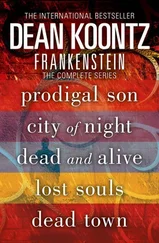He rolled Neddy onto one side, but no gold watch lay underneath, so he let the musician flop onto his back again.
Now here was a thing, worse than the thought of a quarter in the closed hand: Neddy's eyes seemed to follow Junior as he rooted among the trash bags.
He knew that the only movement in those staring, sightless eyes was the restless reflection of the flashlight beam as he probed the trash with it. He knew he was being irrational, but nevertheless he was reluctant to turn his back on the corpse. Repeatedly in the midst of searching, he snapped his head up, whipping his attention to Neddy, certain that from the comer of his eye, he had seen the dead gaze following him.
Then he thought he heard footsteps approaching in the alley.
He doused the light and crouched motionless in the absolute darkness, leaning against a wall of the dumpster to steady himself, because his feet were planted in slippery layers of fog-dampened plastic trash bags.
If there had been footsteps, they had fallen silent the moment Junior froze to listen for them. Even over the hard drumming of his heart, he would have heard any noise. The pillowy fog seemed to smother sound in the alleyway more effectively than ever.
The longer he crouched, head cocked, breathing silently through his open mouth, the more convinced Junior became that he had heard a man approaching. Indeed, the terrible conviction grew that someone was standing immediately in front of the dumpster, head cocked, also breathing through his open mouth, listening for Junior even as Junior listened for him.
What if...
No. He wasn't going to what-if himself into a panic.
Yes, but what if...
Maybes were for babies, but Caesar Zedd had failed to provide a profundity with which Junior could ward off the what-ifs as easily as the maybes.
What if the stubborn, selfish, greedy, grubbing, vicious, psychotic, evil spirit of Thomas Vanadium, which had earlier pursued Junior through another alleyway in broad daylight, had followed him into this one in the more ghost-friendly hours of the night, and what if that spirit were standing just outside the Dumpster right now, and what if it closed the bifurcated lid and slipped a bolt through the latch rings, and what if Junior were trapped here with the thoroughly strangled corpse of Neddy Gnathic, and what if the flashlight failed when he tried to switch it on again, and then what if in the pitch-blackness he heard Neddy say, “Does anyone have a special request?"
RED SKY IN THE morning, sailors take warning; red sky at night, sailors delight.
On this January twilight, as Maria Elena Gonzalez drove south along the coast from Newport Beach, all men of the sea must have been reaching for bottles of rum to celebrate the fruit-punch sky: ripe cherries in the west, blood oranges overhead, clustered grapes dark purple in the east.
This sight that might inspire celebration among sailors was denied to Barty, who rode in the backseat with Agnes. Neither could he see how the crimson sky studied its painted face in the mirror of the ocean, nor how a burning blush shimmered on the waves, nor how the veil of night slowly returned modesty to the heavens.
Agnes considered describing the sunset to the blinded boy, but her hesitancy settled into reluctance, and by the time the stars came out, she had said not a word about the day's splendorous final act. For one thing, she worried that her description would fall far short of the reality, and that with her inadequate words, she might dull Barty's precious memories of sunsets he had seen. Primarily, however, she failed to remark on the spectacle because she was afraid that to do so would be to remind him of all that he had lost.
These past ten days had been the most difficult of her life, harder even than those following Joey's death. Back then, although she had lost a husband and a gentle lover and her best friend all at once, she'd had her undiminished faith, as well as her newborn son and all the promise of his future. She still had her precious boy, even though his future was to some extent blighted, and her faith remained with her, too, though diminished and offering less solace than before.
Barty's release from Hoag Presbyterian had been delayed by an infection, and thereafter he had spent three days in a Newport-area rehabilitation hospital. Rehab consisted largely of orientation to his new dark world, since his lost function could not be recovered by either diligent exercise or therapy.
Ordinarily, a child of three would be too young to learn the use of a blind man's cane, but Barty wasn't ordinary. Initially, no cane was available for such a small child, so Barty began with a yardstick sawn off to twenty-six inches. By his last day, they had for him a custom cane, white with a black tip; the sight of it and all that it implied brought tears to Agnes just when she thought her heart had toughened for the task ahead.
Instruction in Braille wasn't recommended for three-year-olds, but an exception was made in this case. Agnes arranged to have Barty receive a series of lessons, although she suspected that he'd absorb the system and learn to use it in one or two sessions.
Artificial eyes were on order. He would soon return to Newport Beach for a third fitting before implant. They weren't glass, as commonly believed, but thin plastic shells that fit neatly behind the eyelids in the cavities left after surgery. On the inner surface of the transparent artificial cornea, the artificial iris would be skillfully hand-painted, and movement of the ocular prosthesis could be achieved by attaching the eye-moving muscles to the conjunctiva.
As impressed as Agnes had been with the sample orbs that she'd been shown, she allowed no hope that the singular beauty of Barty's striated emerald-sapphire eyes would be re-created. Although the artist's work might be exquisite, these irises would be painted by human hands, not by God's.
With his empty sockets draped by unsupported lids, Barty rode home wearing padded eye patches under sunglasses, his cane propped against the seat at his side, as though he were costumed for a role in a play filled with a Dickensian amount of childhood suffering.
The previous day, Jacob and Edom had driven back to Bright Beach, to prepare for Barty's arrival. Now they hurried down the back porch steps and across the lawn, as Maria followed the driveway past the house and parked near the detached garage at the rear of the deep property.
Jacob intended to carry the luggage, and Edom announced that he would carry Barty. The boy, however, insisted on making his own way to the house.
“But, Barty,” Edom fretted, “it's dark."
“It sure is,” Barty said. When only a mortified silence followed his remark, he added: “Gee, I thought that was kinda funny."
With his mother, his uncles, and Maria hovering just two steps behind, Barty followed the driveway, not bothering with the cane, keeping his right foot on the concrete, his left foot on the grass, until he came to a jog in the pavement, which apparently he'd been seeking. He stopped, facing due north, considered for a moment, and then pointed due west: “The oak tree's over there."
“That's right,” Agnes confirmed.
With the great tree ninety degrees to his left, he was able to locate the back-porch steps at forty-five degrees. He pointed with the cane, which otherwise he had not used. “The porch?"
“Perfect,” Agnes encouraged.
Neither hesitantly nor recklessly, the boy set off across the lawn toward the porch steps. He maintained a far straighter line than Agnes would have been able to keep with her eyes closed.
At her side, Jacob wondered, “What should we do?"
“Just let him be,” she advised. “Just let him be Barty."
Читать дальше











